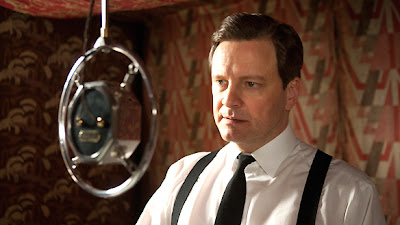The King's Speech
Directed by Tom Hooper
Screenplay by David Seidler
Cast
George VI/Albert -- Colin Firth
Lionel Logue -- Geoffrey Rush
Queen Elizabeth -- Helena Bonham Carter
King Edward VIII -- Guy Pearce
Myrtle Logue - Jennifer Ehle
It seems a futile attempt to make a nearly two-hour-long movie out of the life of a man with a stammer. Aside from the privileges that a monarch gains by birth, there is hardly anything to talk about King George VI's stuttering. In The King's Speech, however, Tom Hooper successfully creates vibrant drama about Albert ("Bertie"), an extremely shy monarch, and Lionel Logue, the king's speech therapist. While the film focuses on how Albert overcomes his physical obstacle and delivers his first wartime speech at the outset of World War II, it doesn't go into the details of the war, save for a brief montage of war footage. No conflict within the royal family, nor a battle over the throne. Then what is it that fills this seemingly lackluster story with vitality?
The central dynamic can be seen between Albert and Lionel whose relationship takes a dramatic turn. Here, the monarch who is supposed to give a faltering nation confidence seeks the Australian's help and his speech impediment places him in a vulnerable position. To Albert, Lionel is peculiar because of not only his unorthodox methods but also his demand for equality during their sessions. And what about the king's relationship with his people? The healing process becomes symbolic as the king's personal handicap translates into a whole nation's insecurities and as the successful delivery of his first wartime speech into the people's assurance of victory.
Adding further depth to this multifaceted narrative is Hooper's use of camera angles and compositions. Hooper deliberately exploits low- and wide-angle shots to make Albert's fear of public speaking appear far more severe. In the opening scene, all the emotionless, indistinct faces of the audience humiliate his stuttering Royal Highness; during his session with a therapist before Lionel, Albert seems overwhelmed by the therapist's intimating face shot from below; and soon after Albert's sudden ascension to the throne, he is surrounded by members of the government whose distorted image creates a stifling atmosphere. Also, an interesting contrast between Albert and Lionel is formed by the unconventional compositions in which Albert's unsureness speaks through the abstract background he sits against, whereas Lionel's cluttered office hints at his self-confidence.
When Albert's first wartime radio broadcast is finally heard worldwide, Lionel guides him as if to conduct a symphonic piece. Walking out of the broadcasting room, the king sees relief on people's faces. Despite a few alleged historical inaccuracies, such as the king's relationship with his brother, the movie offers a compelling drama centering on "Bertie" and the therapist's friendship. As well, combined with Colin Firth's meticulous performance, the extreme closeups of Albert's face when he stammers effectively convey his insecurities. Geoffrey Rush's enigmatic, but warmhearted, Lionel, and Helena Bonham Carter's supportive Queen Elizabeth make the film rich in character. The most impressive moment in The King's Speech comes as Albert and Lionel walk through the dense fog, which symbolizes the uncertainty of that time.

No comments:
Post a Comment